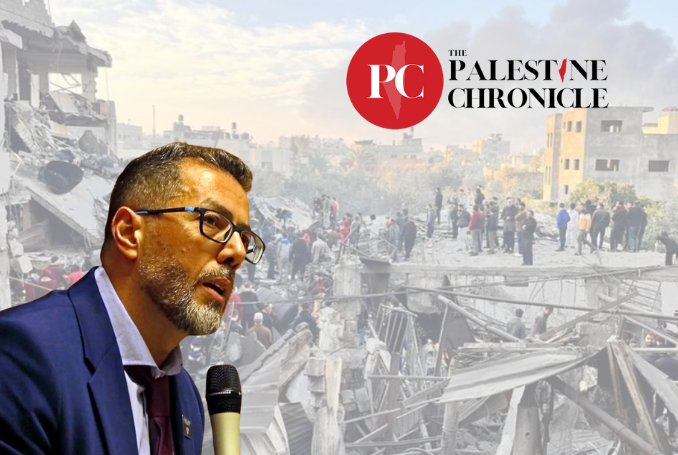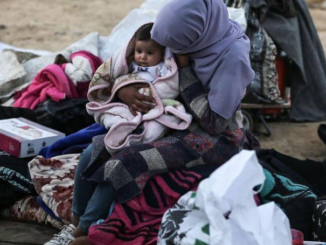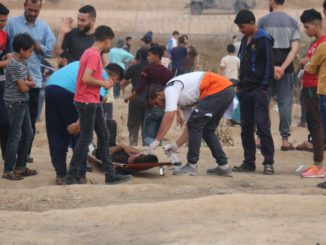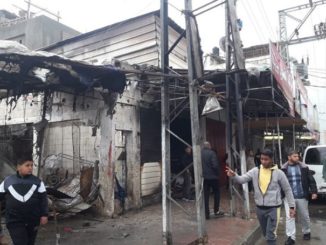
Below are excerpts from an interview conducted with Dr. Ramzy Baroud and published in the Hamshahri newspaper.
Baroud is a journalist, author and the Editor of The Palestine Chronicle. He is the author of six books. His latest book, co-edited with Ilan Pappé, is ‘Our Vision for Liberation: Engaged Palestinian Leaders and Intellectuals Speak Out’. His other books include ‘My Father was a Freedom Fighter’ and ‘The Last Earth’. Baroud is a Non-resident Senior Research Fellow at the Center for Islam and Global Affairs (CIGA).
Palestine and the Arabs
How does the Arab world see the Israel-Palestine conflict?
Arab masses never deviated from seeing Palestine and the Palestinians as integral parts of Arab political consciousness. Even during times of political and security upheavals, Palestine continued to feature prominently as the single most important Arab cause. Recent Arab opinion polls attest to this fact.
The struggle has been and remains with Arab regimes, which are merely seeking to survive by operating within Western spheres of influence.
These regimes are functional to US and Western interests, as they historically served as a buffer between disenchanted, and often rebellious masses, and Western interests and agendas.
The Arab world will finally head in the right direction once the Arab people are able to breach that wall, therefore aligning themselves with the proper course of historical evolution towards true sovereignty and political independence – thus translating their passion for Palestine into being active participants in the process of liberation.
AL-QASSAM BRIGADES: We bombed two gatherings of occupation soldiers north and east of the city of Khan Yunis, south of the Gaza Strip, with heavy-caliber mortar shells.
FOLLOW OUR LIVE BLOG:https://t.co/fUNgoPlf2f pic.twitter.com/iLChadRZaZ
— The Palestine Chronicle (@PalestineChron) December 25, 2023
Red Sea Coalition
What are your thoughts on the US-led coalition formed against Yemen?
This is not the first US-led coalition in the Middle East, but it is certainly one of the most absurd. Unlike previous American coalitions, for example against Iraq, Syria, and even ISIS, this coalition lacks serious allies, and does not include most influential Arab countries, like Egypt and Saudi Arabia.
Washington has little leverage against the Ansarallah group in Yemen. It has taken on Yemen repeatedly in the past and it has failed. Washington’s Arab and Muslim allies also failed in their latest war on the group, which continues to grow in terms of military power and preparedness.
It is hard to imagine that this US-led coalition will be able to control, let alone push back, the empowered Ansrallah group, which has transferred itself from a national actor, operating within the borders of Yemen alone, to a regional power, taken seriously by everyone.
The irony in all of this is while the US is desperate to stabilize the Red Sea, it is turning the Red Sea into a war zone. This is an old, but failed American tactic, imposing ‘stability’ through firepower. This has not worked in a very long time, and never worked in the Middle East; to the contrary, as we have seen in Iraq and Afghanistan, it is usually the US that escapes the very military conflicts it has created, in the name of bringing stability, ‘restoring democracy’ or fighting terrorism.
What’s Next for Gaza
Based on your deep understanding of the Palestinian issue, what are your predictions for the future of Gaza and the fate of the Palestinians living there?
I think Gaza, despite the massive destruction underway, will emerge stronger, and that armed Resistance will return as the driving force of Palestinian, in fact, Arab Resistance, in Palestine and across the Middle East.
This is precisely why Tel Aviv and Washington are desperate to claim any kind of victory in Gaza. They fully understand the consequences of an Israeli defeat by a small and isolated region like the Gaza Strip
I also expect that there will be a truly new Middle East, to parallel and challenge the old order established by Washington and its Western allies following World War II.
The push for normalization between Israel and other Arab countries was meant to cement the old decaying order at a time that the global geopolitical balances have been largely tilting in favor of Washington’s enemies across the world.
According to Gaza’s Ministry of Health, 20,674 Palestinians have been killed, and 54,536 wounded in Israel’s ongoing genocide in Gaza starting on October 7.
Palestinian and international estimates say that the majority of those killed and wounded are women and children.
FOLLOW… pic.twitter.com/wGxmr1ZyNt
— The Palestine Chronicle (@PalestineChron) December 25, 2023
Normalization was meant to be a fortification strategy to prevent the global powers like China and Russia, and regional powers like Iran, from extending their influence across the region.
The Gaza war is demolishing this American fortification, thus the last Western strategy to keep the Middle East as an American protectorate.
Time will tell how this will play out, but if the Resistance camp in the region emerges stronger, this new Middle East will serve as the fatal shot of Washington’s new stratagem in the region.
Western Media and Palestine
Are mainstream media biased towards Israel? Are western views on Palestine changing due to the war?
Mainstream media remain committed to its Israeli project. If there are any protesting voices, they only represent those, like Thomas Friedman at the New York Times, who warn against Israeli folly in seeking a war in Gaza without clear objectives, or post-war political plans.
In other words, most of those who protest Israel’s actions against the Palestinians, they do so out of their love for Israel, not the Palestinians.
Independent and progressive media, however, along with the massive influence of social media, have managed to turn most Western societies against the war, and Western youth in particular, against Zionism, Israeli apartheid in the West Bank and genocide in Gaza.
In some strange way, non-mainstream media has managed to win the war of narrative in favor of Palestine, and by doing so, they canceled the destructive influence that mainstream corporate media have played in shaping the political discourse about Palestine and Israel.
(The Palestine Chronicle)








